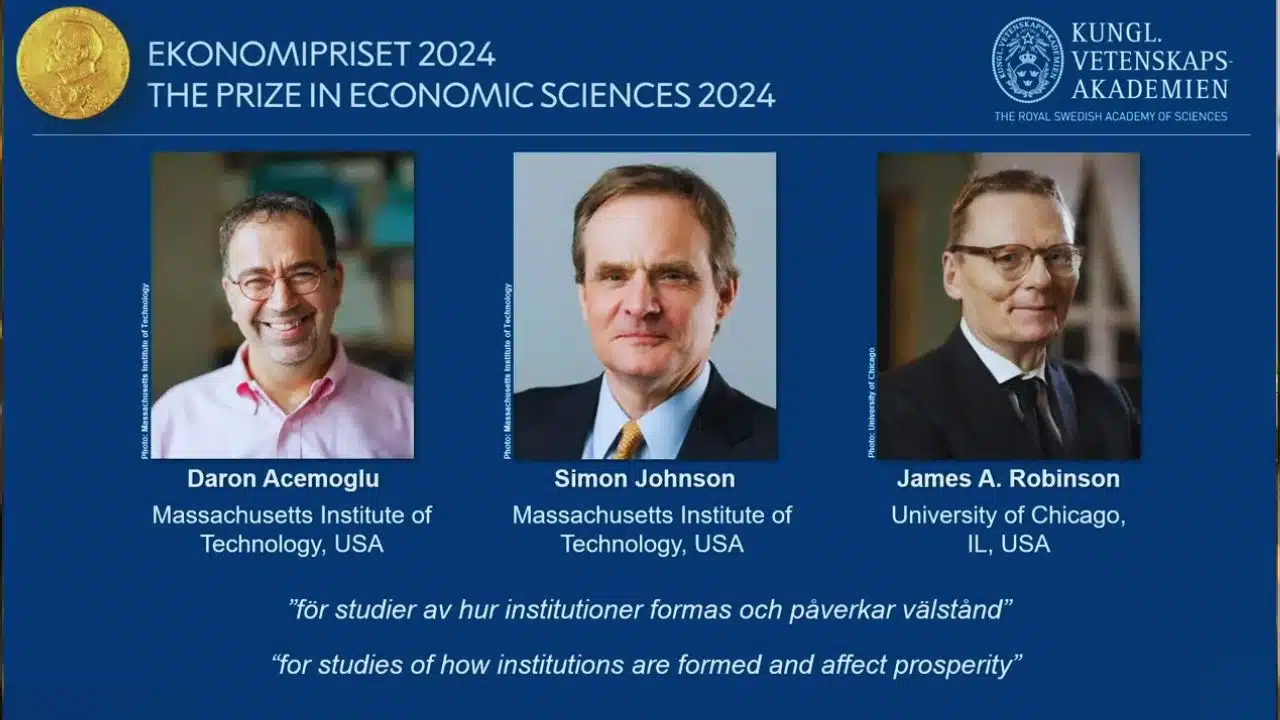The prestigious Nobel Prize in Economic Sciences has honored three distinguished economists, Daron Acemoglu, Simon Johnson, and James Robinson.
This recognition comes in light of their influential research exploring why some countries achieve wealth while others lag behind. The Nobel Committee awarded them a prize of 11 million Swedish kronor (approximately $1 million) for their significant contributions.
Exploring the Role of Institutions
The laureates’ work focuses on the impact of institutions on economic growth. Their research indicates that countries with strong, inclusive institutions that support the rule of law and protect property rights tend to prosper.
In contrast, nations with extractive institutions that benefit the elite at the expense of the general population struggle with economic stagnation.
The introduction of more inclusive institutions, less extraction and the rule of law would create long-term benefits. So why don’t the elite simply replace the existing economic system?
The laureates’ model for explaining the circumstances under which political institutions are… pic.twitter.com/oPCbMndkQM
— The Nobel Prize (@NobelPrize) October 14, 2024
Colonial Roots of Modern Economic Divides
A pivotal aspect of their research highlights how colonization reshaped global economic landscapes. The committee asserts that the laureates have demonstrated that the societal institutions introduced during colonization serve as one explanation for the differences in countries’ prosperity.
Like related read: Nobel Prize in literature
In some cases, colonization led to the development of exploitative systems that hindered economic development. However, in other regions, it set the groundwork for inclusive systems that catalyzed growth and change.
Significant Publications and Theories
Acemoglu and Robinson, professors at MIT and the University of Chicago, respectively, argue in their groundbreaking 2012 book, Why Nations Fail, that a nation’s political and economic institutions primarily determine its wealth.
They exemplify this with a tale of two towns named Nogales, one in the United States and the other in Mexico, showing how differing local institutions lead to distinct levels of prosperity.
Like related read: Nobel Prize in Chemistry
Following this, Acemoglu, together with Johnson, explored the relationship between technology and power in their recent publication, Power and Progress.
They examined how technological advancements, though potentially transformative, have historically benefited societal elites more than the broader populace, posing challenges to both economic equity and democratic structures.
Does Democracy Equal Growth?
While the research supports the benefits of democratic systems, Acemoglu clarifies that democracy alone is not a cure-all for economic challenges. He notes that authoritarian growth, while sometimes rapid, tends to be less stable and less innovative over time.
This viewpoint is particularly relevant in discussions about countries like China, which, despite its non-inclusive institutions, has made significant investments in innovative sectors such as AI and electric vehicles.
Legacy and Continued Impact
Although Sweden’s central bank established the Nobel Prize in Economic Sciences rather than Alfred Nobel in 1968, it still recognizes important economic research.
Like related read: Nobel Prize 2024 Full Winners List
Claudia Goldin, last year’s laureate, garnered recognition for her analyses of gender disparities in the labor market, offering insights that align with ongoing discussions about equality and economic participation.
Through their meticulous research and extensive publications, Acemoglu, Johnson, and Robinson have provided a framework that significantly enhances our understanding of global economic disparities and the historical roots that shape them. Their work not only enriches academic discourse but also informs policy-making, aiming for a more equitable global economy.





































